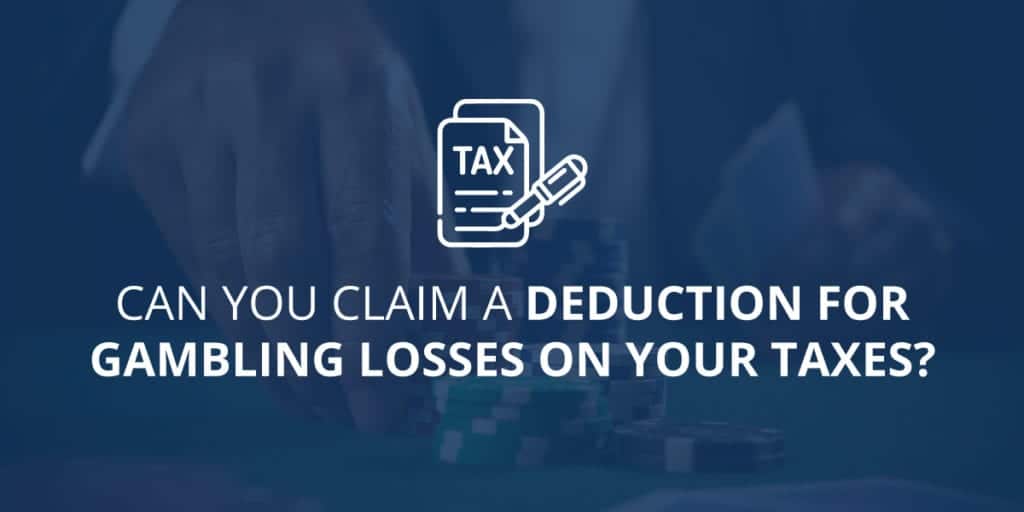
Are gambling losses deductible? Any money won gambling is considered taxable by the IRS. Gambling winnings include cash prizes and the fair market value of any item won from lotteries, casinos, racetracks, game shows, etc. If you’ve won big, you may be subject to a rather large tax penalty on those winnings.
However, gambling losses can offset tax liability, but only to the extent of winnings and only if you itemize your deductions. You first need to owe on the gambling winnings before any loss deduction becomes available. Regardless of whether you can take advantage of the loss deduction, all gambling winnings must be reported to the IRS via Schedule 1 (Form 1040) under “other income”.
Why Does the IRS Allow a Deduction for Gambling Losses?
First, it is important to keep in mind that losing money from gambling does not alone reduce your overall tax liability. In order to even qualify for a loss deduction, you must owe tax on your winnings. Then, total losses can be deducted only to the extent of total winnings. Remaining losses cannot be written off or carried forward to offset future tax liability.
Policy-wise, the IRS is not aiming to subsidize gambling by allowing taxpayers to claim a deduction for their losses. Allowing a deduction on losses up to winnings is merely a way to better measure income.
What Can I Do to Make Sure the IRS Accepts My Loss Deduction?
If you wish to deduct your losses, it is important to keep in mind that the IRS requires detailed records of both winnings and losses. If you win big enough, the payer will send you a Form W2-G. Remember, the IRS also receives a copy of the W2-G, so they will expect gambling winnings to be reported on your taxes. Receipts, payment slips, and tickets are important to keep on hand. Are gambling losses deductible.
The IRS suggests a gambling log or diary be kept with specific details about the type of gambling activity, where the gambling took place, who the gambling was with, and the amounts of winnings and losses, among other specifics the taxpayer might find helpful in referring to any specific gambling activity in the event of an audit. Canceled checks, credit records and receipts from the gambling facility may also be helpful in keeping track of your wagering.
What if I am a Professional Gambler?
If gambling is your actual profession, the IRS will generally consider gambling income as regular earned income. As such, it will be taxed at your normal income tax rate.
If you’re a professional gambler looking to deduct your losses as business expenses on Schedule C, the losses must qualify as a business expense, meaning your primary purpose in the gambling must have been to make a profit and you must be continually and regularly involved in gambling. Sporadic gambling or gambling as a hobby will not count for business deduction purposes.
Moreover, the Tax Cuts and Jobs Act (“TCJA”) modifies the limits on gambling losses for professional gamblers. Between 2018 and 2025, all deductions for expenses incurred while gambling is limited to the extent of winnings. This means that out-of-pocket expenses for transportation, meals, lodging, etc. are included in the cap for deducting only to the extent of winnings.
Can I Deduct Gambling Losses as a Non-Business Casualty Loss Under Section 165?
No. As a recent Tax Court opinion demonstrates, Section 165(c)(3) allows taxpayers to deduct nonbusiness losses that “arise from fire, storm, shipwreck, or other casualties, or from theft.” The loss must be sudden, unexpected, and unusual.
Furthermore, section 165 only applies where the taxpayer’s property has suffered physical damage. Funds vanishing from a bank account due to gambling do not constitute physical damage to property.
Therefore, even if the gambling is a product of sudden, unexpected and unusual incapacitation due to the onset of a disease or resulting from medication diminishing mental capacity, the taxpayer is not entitled to a deduction under section 165 for casualty losses.
Are There Any Other Barriers to Claiming a Deduction?
Non-resident aliens generally cannot deduct gambling losses. There is an exception for Canadian citizens who may deduct their losses to the extent of their winnings.
You may owe state or local taxes on your gambling winnings as well. You may or may not be able to deduct gambling losses on your state tax return. You should check with your state tax department to see what rules apply.
Contact RJS Law | Southern California Tax Law Firm
Are gambling losses deductible? Our firm represents businesses through Southern California in IRS tax audits and appeals as well as Tax Court litigation. If you have questions and would like to speak with an attorney, please call 619-595-1655 or contact us online for a complimentary case evaluation.

Leave a Reply